75 Years of The Life and Death of Colonel Blimp
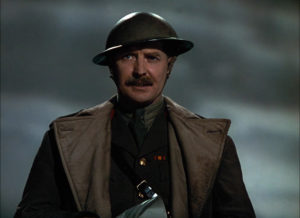
The film-making partnership of Michael Powell and Emeric Pressburger (known collectively as The Archers) produced some highly influential films during the 1940s and 1950s (including Black Narcissus and The Red Shoes), but one of their very best collaborations remains 1943’s The Life and Death of Colonel Blimp which celebrates the 75th anniversary of its theatrical release in June 2018. Deriving its title from the satirical comical strip by cartoonist David Low, The Life and Death of Colonel Blimp has, thankfully, been reissued and restored over the years and correctly reappraised as one of the very best British films of all time. The directing team of Powell and Pressburger were quite adamant that the essential idea behind the film did not emanate from the newspaper strip by Low, but rather from a scene cut from their previous film (1942’s One of Our Aircraft Is Missing) in which an older member of the RAF crew tells a younger man that he doesn’t know what it’s like to be old. This is a theme which recurs throughout the course of Colonel Blimp and it’s first visited at an early juncture of the film when a Home Guard unit (commanded by the zealous Spud Wilson) engage preemptively in a training exercise and seek to capture the central character. The setting is a Turkish bath in London and it’s interesting to note that Low had developed his character following a conversation he overheard between two military men in such a location. At first glance the personage of Blimp – whose real name is Clive Candy – appears to be stereotypical in nature. Overweight and sporting a prominent moustache, the General protests against this unwarranted intrusion in the strongest way possible – ‘You’re an extremely impudent young man!’ he informs Spud when the latter tells him why he has decided to commence the training exercise hours in advance. The rationale employed by the junior officer seems reasonably sound. The year is 1942 and, in the throes of this world war, honour and decency are surely outdated notions. The enemy does not obey the principles of a clean fight, so why should we is effectively his argument. Candy, however, takes exception to this and to the verbal knocks against his own mindset – ‘Do you know how many wars I’ve been in?’ he asks Spud as he throws him into the pool; ‘You laugh at my big belly, but you don’t know how I got it. You laugh at my moustache, but you don’t know why I grew it. How do you know what sort of a fellow I was when I was as young as you are? 40 years ago….40 years ago….’
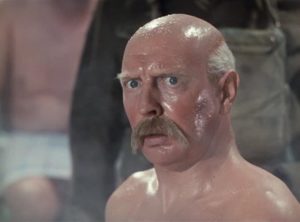
The remarks made by Candy at this early moment in the film signal to the audience that there is a deeper personal history at play here and, to this end, the filmmakers effect a glorious transition in time as a younger and much leaner Candy emerges from the water at the other end of the pool. The year is 1902 and Candy has returned from the Boer War during which he has been awarded the distinguished Victoria Cross (VC). He is ambitious, energetic and determined, but also somewhat headstrong like Spud and not averse to going against the command of his superiors. When Candy (played by the wonderful Roger Livesey) learns of anti-British propaganda being spread by a German named Kaunitz (particularly with regard to the Boer War), there is little doubt in his mind as to the appropriate course of action. The young Lieutenant travels to Berlin, in spite of orders to the contrary, where he meets with the English Governess – Edith Hunter (Deborah Kerr) – whose letter had brought the matter to Candy’s attention. Candy and Edith dine in a cafe which Kaunitz and his associates frequent and a diplomatic incident ensues when the two men exchange words. The upshot of the affair is that Candy is compelled to take part in a duel as he is deemed to have insulted the ‘whole of the German Army.’
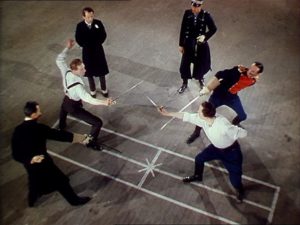
Candy has acted ill-advisedly, but his code of honour decrees that he take part in the duel in order to atone for his rash behaviour. We, the audience, are duly reminded as to how this is still an age which puts value and stock on such notions and mores. The man from the German officer’s corps is a complete stranger to Candy, but we learn of his own personal reluctance with regard to such face-offs. Nevertheless, he has no choice in the matter, nor does Candy. They are both officers and this is the army’s way of resolving the issue. The encounter takes place at the gymnasium of the army barracks in the early hours of the morning and involves one of the most glorious shots of the entire film. As Candy and his opponent Theo Kretschmar-Schuldorff (the memorable Anton Walbrook) commence the swordplay, the camera rises high above them and – in fact – leaves the scene entirely. We are presented with an exterior shot of Berlin on this cold snowy morning. In a nearby cab, Edith Hunter sees a horse-led ambulance emerge from the grounds of the barracks. She surmises correctly that the duel inside has come to an end, but its outcome is not made known to us. Scholars and admirers of the film have noted the deliberate build-up to the duel scene which is rendered an anti-climax of sorts. We see very little of the action which takes place; the length of the combat is never revealed; a victor is never declared, at least not for the purposes of the film’s narrative. The suggestion on the part of the filmmakers seems to be that this epoch of chivalry and uprightness is fast drawing to a close. The world of 1902 is light years away from that of 1942 as was suggested in the earlier Turkish bath scene. There is little place for such ethics any more, high-minded as they may be. Antagonisms are no longer settled in a concentrated or individual context. Modern warfare has become all-encompassing and extreme by its very nature.
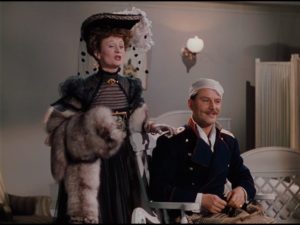
Hospitalised following the duel (on account of an almost severed upper lip), Candy becomes friends with Kretschmar-Schuldorff who, himself, is recuperating from his injuries. He decides to grow a moustache to cover up the scar and spends his evenings drinking and playing cards with Theo (whose knowledge of the English language is limited to the words ‘very much’ at this point). An unmistakable rapport develops between the two men which becomes one of the central and most resonant narrative threads of Blimp. The years ahead – as we know from a historical perspective – will see the men fight a war on opposing sides. What chance has a friendship in the face of such global and consequential events we ask ourselves. Will one of the men become embittered or resentful as social and political occurrences take their course? Meantime, a further complication arises on a far more personal level. Candy realises all too late that he has feelings for Edith Hunter. But Theo has fallen in love with her already, and she him. Ever the man of rectitude, Candy congratulates the two and stands aside in spite of his romantic inclinations. ‘I hope we’ll meet again sometime’ he tells Edith as he bids her farewell. The parting proves to be more than a bittersweet one. Upon his return to London, Clive confides in his Aunt Margaret (Muriel Aked) apropos his lingering affections for Edith Hunter.
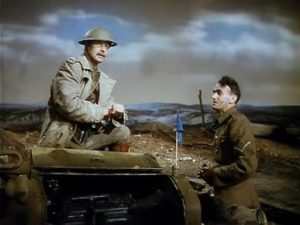
The film transitions then to Flanders in late 1918. We find Candy – now a Brigadier-General – at the rain-soaked front. The stark terrain and deplorable conditions leave us in little doubt as to the film’s view of this particular conflict. The value of friendship still informs much of Candy’s world view and he seeks out information regarding Theo in spite of the fact that they are on opposite sides. When he learns of a German regiment’s attempt to blow up a bridge, he uses the opportunity to question these men as to Theo’s possible whereabouts. A matter of great personal import occurs when he sees a woman at a nurse’s station who bears an uncanny resemblance to Edith Hunter; again this character is played by Deborah Kerr. The following morning – as he travels to catch his train – Candy learns of the armistice which is due to come into effect at 11 a.m. As the guns fall silent across the Western Front, Candy tells his batman Murdoch (John Laurie) how he believes the war has been won – ‘It means that right is might after all. The Germans have shelled hospitals, bombed open towns, sunk neutral ships, used poison gas, and we won clean fighting; honest soldering has won.’
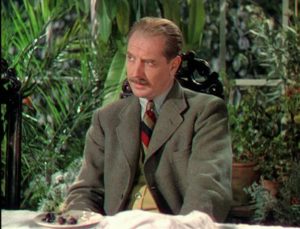
The drama of the film moves on to a notice in a newspaper of an impending marriage. We learn that Candy has sought out the young nurse whom he saw at the front. Her name is Barbara Wynne (played by Kerr as I mentioned) and she is some 20 years his junior. Candy learns that Theo is being held at a prisoner of war camp in England and travels with Barbara to visit him. When the German refuses to meet Candy in the commandant’s office, Clive seeks him out on the grounds, but is greatly disappointed when his old friend curtly snubs him. There is a reconciliation however when Theo (who is about to be repatriated to Germany) contacts Clive and accepts an invitation to his house. When he meets various members of the establishment at dinner, Theo articulates his lack of confidence with respect to his country’s future now that she is a vanquished nation – ‘I’m going home, if there’s such a thing left in Germany.’ On a more intimate level, Theo reveals to Candy that he and Edith now have two children. With a discernible degree of scepticism, he listens to Clive as the latter extols the need to get Germany back on her feet again. The history of the intervening years and the subsequent failure of the Weimar Republic are well known to us and would certainly have been more than palpable to the filmmakers given the fact that the production took place while war was still raging. The well-intentioned notion of getting Germany back on her feet is fine in conceptual terms, but the point here I think was to force audiences to question how Nazism might have been prevented. Did prevailing social and economic circumstances play into the hands of Hitler and his acolytes? Absolutely. A subsequent speech by Theo refers to this when he tells Clive that ‘You forgot to learn the moral. Because victory was yours, you failed to learn your lesson twenty years ago.’
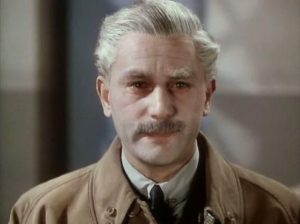
One of Blimp’s most critically praised and emotionally affecting scenes involves Theo and it’s a masterclass in acting by Anton Walbrook. The year is now 1938 and Kretschmar-Schuldorff has returned to England for a second time. On this particular occasion, he hopes to remain there on a permanent basis. The interim years have witnessed losses for both himself and Candy. Barbara has died at a young age (in 1926) and Edith Hunter has also passed away. Questioned by an immigration officer, the older Theo – now effectively a refugee – tells of how he no longer has any connection with his children as they have joined the Nazi Party. He also speaks with some emotion about his own personal history and how he was ‘overcome with a desire to return to my wife’s country.’ The single take which lasts almost three minutes is one of the best acted scenes in Blimp and it highlights Walbrook’s considerable skills as an actor. In the 25-minute documentary on the film, Scottish director Kevin Macdonald (who is a grandson of Emeric Pressburger) speaks about his grandfather’s great love for England notwithstanding his Hungarian background. Macdonald refers to The Life and Death of Colonel Blimp as Pressburger’s most personal film. If this is indeed the case, then surely this scene involving Walbrook is one of the most significant of all in the film. It’s a fantastically written piece which combines elements of nostalgia with a deep sense of foreboding for the future. And Walbrook, as I said, carries it off with consummate skill playing an older man who has seen too much and has come to this corner of the world to find a modicum of solace.
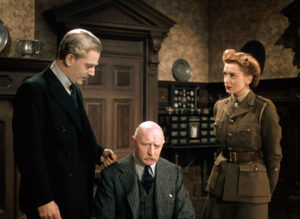
The third act of the film per se also involves the third cycle of Theo’s friendship with Candy. Dining together once again at Clive’s house, Theo is surprised to learn of his friend’s secret love for Edith Hunter – ‘I never thought it possible an English man could be so romantic.’ Candy has his driver Angela Cannon (Deborah Kerr once again) transport Theo home and the latter notes the strong resemblance she bears to Edith. In the aftermath of Dunkirk meantime, Candy is invited to deliver a talk on the BBC concerning the war effort generally. To his great dismay, the broadcast is pulled at the last moment and he is informed that the nature and tone of his speech is considered ‘ill-timed.’ The general is further displeased when he learns that he is being retired for a second time in his career. A more practical-minded Theo reminds him of how notions of a fair fight and a noble engagement are hopelessly outdated in the present time – ‘This is not a gentleman’s war. This time you’re fighting for your very existence against the most devilish idea ever created by a human brain – Nazism. And if you lose, there won’t be a return match next year; perhaps not even for a hundred years.’
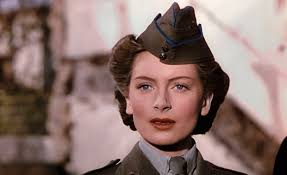
Upon Angela’s suggestion, Candy involves himself actively in the Home Guard. In spite of setbacks such as the destruction of his own house in an air raid and the death of Murdoch, the old general throws himself into this new role with much gusto. He appears on the front of Picture Post as he spearheads the development of the volunteer movement and seems to recapture much of his former vigour and spirit. The film duly comes full circle as an ambitious training exercise involving the defence of London is set in motion – ‘War starts at midnight!’ Following the rather undignified debacle of the Turkish bath scene, a somewhat despondent Candy decides not to press any charges against Spud Wilson as he recalls how he too was once a young foolish man. In the presence of Theo and Angela, Candy stares across at the site where his house had once stood. Hearing the voice of Barbara in his head, he is reminded of how he’d promised his wife not to change until his house was flooded and ‘this is a lake.’ As he gazes now where the water resides, Candy comments that ‘Here is the lake and I still haven’t changed.’ As the Home Guard marches into London – as part of the training exercise – the old general stands proudly to attention and salutes the passing men. A sense of fulfillment is etched in the lines of his visage in spite of the realisation that he remains at heart a traditionalist who sets great store on the ideals of a bygone era. Roger Ebert in his 2002 reappraisal of this great film remarks upon ‘the way the movie transforms a blustering pigheaded caricature into one of the most loved of all movie characters.’ In spite of his own professed shortcomings, Candy is a decent man who has endeared himself to us during the course of the film. He has – in Ebert’s words – revealed himself to be an ‘idealist and a romantic.’
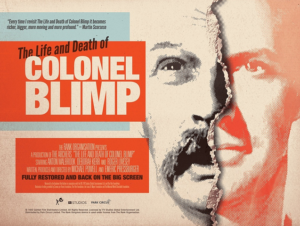
The first of Powell and Pressburger’s collaborations to be shot in Technicolor, The Life and Death of Colonel Blimp was also instrumental in bringing one Jack Cardiff to the attention of the Archers. Cardiff is credited as a Technicolor Cameraman on Blimp and he was responsible for the sequences in which we see various animal heads appearing on the walls of Aunt Margaret’s house in London as a result of Candy’s hunting trips abroad. Cardiff would go on to to act as cinematographer on Powell and Pressburger’s A Matter of Life and Death, Black Narcissus (for which he won the Academy Award for best cinematography) and The Red Shoes. The cinematographer on Blimp was Frenchman Georges Perinal who had won the Academy Award for Best Cinematography for 1940’s The Thief of Bagdad. Prominent film critics and historians such as Martin Scorsese have quite correctly praised the visual style and production design (Alfred Junge) employed in Blimp. Speaking about the 2011 restoration of the film, Scorsese refers to the huge technicolor camera used in the production which Michael Powell dubbed the ‘enchanted cottage.’ It wasn’t all plain sailing on the production however and admirers of the film, including myself, will be well aware of the attempts by the powers-that-be such as the Ministry of Information, the War Office and Winston Churchill to thwart the progress of principal photography. Still in the throes of World War II, the establishment did not care for this film which – although pro-British in spirit and sentiment – also took a deliberate and somewhat critical view on matters such as the nature of modern-day warfare and the sometimes anachronistic views of its central character. The sympathetic portrayal of a German character (Theo Kretschmar-Schuldorff) would not have won the film many fans at the time of its release either. The subject of a hideous cut which reduced the film down to a paltry 90-minute version for television at one point in time, Blimp was happily re-released in its intended form in 1983 and was properly restored, as I previously mentioned, in 2011. It’s now generally recognised as a classic of British cinema and one of the best produced by Michael Powell and Emeric Pressburger. Much admired for its affecting storyline, direction, cinematography, art direction and production design and superb lead performances (Livesey, Walbrook and Kerr), The Life and Death of Colonel Blimp has aged very well over the course of the past 75 years and remains essential viewing for fans of The Archers and British cinema generally. A pertinent and poignant film which simply gets better with each and every viewing.